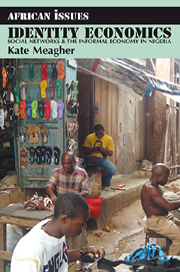Book contents
- Frontmatter
- Contents
- List of Figures & Tables
- Acknowledgements
- Abbreviations
- 1 Introduction
- 2 Beyond the Cultural Turn
- 3 Oracles, Secrets Societies & Hometown Identities
- 4 Unleashing Popular Entrepreneurship
- 5 The Scramble for Weak Ties
- 6 Negotiating the Web of Associational Life
- 7 Collective Efficiency or Cutthroat Cooperation?
- 8 Informality, Cliental Networks & Vigilantes
- 9 Missing Link or Missed Opportunity?
- Epilogue
- Appendices
- Bibliography
- Index
2 - Beyond the Cultural Turn
Rethinking African Informality
Published online by Cambridge University Press: 05 April 2013
- Frontmatter
- Contents
- List of Figures & Tables
- Acknowledgements
- Abbreviations
- 1 Introduction
- 2 Beyond the Cultural Turn
- 3 Oracles, Secrets Societies & Hometown Identities
- 4 Unleashing Popular Entrepreneurship
- 5 The Scramble for Weak Ties
- 6 Negotiating the Web of Associational Life
- 7 Collective Efficiency or Cutthroat Cooperation?
- 8 Informality, Cliental Networks & Vigilantes
- 9 Missing Link or Missed Opportunity?
- Epilogue
- Appendices
- Bibliography
- Index
Summary
Introduction
Efforts to decipher the dynamics of African informal economic networks have been complicated by the collapse of the informality paradigm. Amid processes of deregulation, globalization and weakening states, informal forms of economic organization have become so pervasive, and so deeply intertwined with formal economic structures that the old notion of an ‘informal sector’ or ‘informal economy’ has been called into question. Informal economic arrangements based on social ties and embedded institutions have entered into the heart of contemporary economies through processes of subcontracting, moonlighting, transnational migration, and diminishing state involvement in popular welfare and employment. Far from illuminating these processes, contemporary research on African informality is dominated by references to the ‘blurring’ of institutional processes, and the growing ‘illegibility’ of indigenous regulatory arrangements (Arnaut & Højbjerg 2008; Lund 2007). As Christian Lund (2007:3) explains, ‘Organizations and institutions that exercise legitimate public authority, but do not enjoy legal recognition as part of the state, are out of focus.’ The ensuing scramble for conceptual tools to frame the impact of informalization on economic and political processes has given rise to a bewildering array of new concepts, such as ‘real economies’, ‘twilight institutions’, ‘shadow states’, and ‘transboundary formations’ (Callaghy et al., 2001; Lund 2007; MacGaffey 1991; Reno 2000). The search is on for a concept to make African informal economies more legible.
- Type
- Chapter
- Information
- Identity EconomicsSocial Networks and the Informal Economy in Nigeria, pp. 11 - 26Publisher: Boydell & BrewerPrint publication year: 2010



